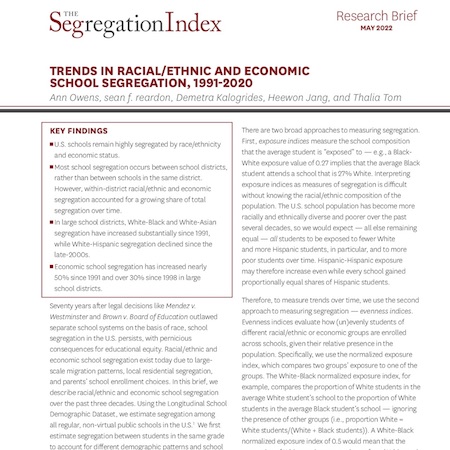 A new project from researchers at Stanford Graduate School of Education and the University of Southern California shows American schools remain highly racially and economically segregated and that segregation is growing in the nation’s largest school districts.
A new project from researchers at Stanford Graduate School of Education and the University of Southern California shows American schools remain highly racially and economically segregated and that segregation is growing in the nation’s largest school districts.
The Segregation Index shows that White-Black segregation between schools within large school districts increased 35 percent, and segregation between poor and non-poor students increased by 47 percent over the past 30 years.
Researchers said most school segregation in the U.S. occurs between school districts. In other words, students are unevenly enrolled across school districts by race/ethnicity or economic status. For example, the Los Angeles Unified School District is 74 percent Latino and 11 percent White, while neighboring Beverly Hills Unified School District is only 9 percent Latino and 69 percent White.
However, “we found racial/ethnic and economic school segregation between schools, within the same school districts, has also increased over the past three decades in large districts,” said Ann Owens, professor of sociology and public policy at the University of Southern California.
“We know segregation leads to unequal educational opportunities and outcomes, so the rapid growth of segregation in large districts indicates that we need a renewed focus on reducing segregation and equalizing educational opportunity,” said Sean Reardon, professor of poverty and inequality in education at Stanford Graduate School of Education.
The creators of the Segregation Index acknowledge that educational policymakers can’t control things like housing affordability, income inequality, the racial wealth gap, migration patterns or families’ neighborhood choices, all of which contribute to school segregation. But, they say, school districts can implement enrollment policies to mitigate segregation, including voluntary integration programs, socioeconomic-based student assignment policies, and school choice policies that affirmatively promote integration.










